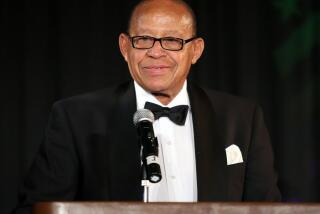Trial Pivotal for Press Too
- Share via
SUMNER, Miss. — When two men went on trial in 1955 for the murder of 14-year-old Emmett Till, it was a signal moment in the civil rights movement--and in American journalism.
The case drew worldwide coverage, and also established a new group of journalists--the courageous reporters, black and white, who would witness and record the civil rights struggle as a beat.
“It was this event that at last galvanized the national press corps, and eventually, the nation,” wrote David Halberstam in his 1993 book, “The Fifties.”
“It was the first story I covered where reporters came from all over the country and all over the world, really,” says James Featherston, then a Jackson Daily News reporter and now a retired Louisana State University journalism professor.
A hundred or more strong, they packed into the sweltering Delta courtroom “like sardines,” Featherston recalls, or lined the square surrounding it. They came from Europe, from New York, and from black journals in northern cities.
John Popham, the New York Times reporter considered to be the only national correspondent at that time assigned full-time to cover the South, helped set up protective ground rules for visitors. They agreed to stay in Clarksdale, 20 miles up the road, and stay out of this tense town after nightfall.
The dozen or so black reporters were initially refused seats, but the presiding judge heeded requests from local white reporters such as Clark Porteous--a pipe-smoking William Faulkner lookalike some visiting reporters thought was the Mississippi author--of the Memphis Press-Scimitar to let them in.
Sheriff H.C. Strider, a hulking man, instructed the blacks to remain at a bridge table set up at the back of the courtroom. “We don’t mix down here,” he explained.
“We were all young, full of energy,” said Doug Shoemaker, then a reporter for the Jackson Daily News, now a Mississippi businessman. “We didn’t have a lot of foresight into what was going to become the civil rights movement.”
More to Read
Sign up for Essential California
The most important California stories and recommendations in your inbox every morning.
You may occasionally receive promotional content from the Los Angeles Times.













